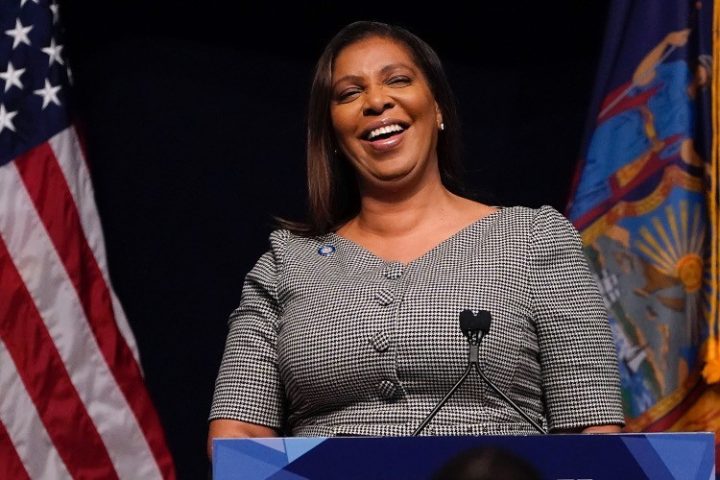
New York State Attorney General Letitia James, who called the National Rifle Association (NRA) a “terrorist organization” with a “poisonous agenda” during her election campaign in 2018, was rebuffed in her attempt to have the group dissolved altogether.
Judge Joel M. Cohen chided AG James for overreaching:
The Attorney General’s claims to dissolve the NRA are dismissed.
Her allegations concern primarily private harm to the NRA and its members and donors, which if proven can be addressed by the targeted, less intrusive relief she seeks through other claims in her Complaint.
The Complaint does not allege that any financial misconduct benefited the NRA, or that the NRA exists primarily to carry out such activity, or that the NRA is incapable of continuing its legitimate activities on behalf of its millions of members.
In short, the Complaint does not allege the type of public harm that is the legal linchpin for imposing the “corporate death penalty.”
Moreover, dissolving the NRA could impinge, at least indirectly, on the free speech and assembly rights of its millions of members. While that alone would not preclude statutory dissolution if circumstances otherwise clearly warranted it, the Court believes it is a relevant factor that counsels against State-imposed dissolution, which should be the last option, not the first.
In other words, Judge Cohen accused James of massive overreach in her attempt to close down the NRA altogether over the alleged, and as-yet unproven, misbehavior on the part of the group’s top officials.
Not surprisingly, James, on the day she filed suit, claimed that politics or her personal animosity against the NRA had nothing to do with her complaint: “This is not a question of the moment that I’ve been waiting for. This is a question … of following the facts and applying the law.”
Of course.
She began the investigation into the NRA’s alleged misconduct within a month of taking office in January 2019, an investigation involving dozens of lawyers and investigators in her office and costing taxpayers millions of dollars. In August 2020, she filed the infamous lawsuit, 169 pages long, detailing what she and her task force found: that NRA CEO Wayne LaPierre
has exploited the organization for his financial benefit, and the benefit of a close circle of NRA staff, board members, and vendors.
Contrary to his statutory duties of care, loyalty and obedience to the mission of the charity, LaPierre has undertaken a series of actions to consolidate his position; to exploit that position for his personal benefit and that of his family; to continue, by use of a secret “poison pill contract,” his employment even after removal and ensuring NRA income for life; and to intimidate, punish, and expel anyone at a senior level who raised concerns about his conduct.
The effect has been to divert millions of dollars away from the charitable mission, imposing substantial reductions in its expenditures for core program services, including gun safety, education, training, member services and public affairs.
And then, in a non sequitur, she claimed that La Pierre and his cohorts cost the group millions of dollars, as a result:
During the period 2015 to 2018, the NRA has reported a reduction in unrestricted net assets by $63 million.
In her humble opinion, therefore, she asked the court to dissolve the NRA, use its remaining liquidated assets to reimburse injured parties, and ban the guilty parties from ever running another charity in New York State:
As a result of these persistent violations of law by the Defendants, the Attorney General seeks a finding by this Court that the NRA is liable to be dissolved … based upon the NRA’s pattern of conducting its business in a persistently fraudulent or illegal manner, abusing its powers contrary to public policy of New York and its tax exempt status, and failing to provide for the proper administration of its trust assets and institutional funds; because directors or members in control of the NRA have looted or wasted the corporation assets, have operated the NRA solely for their personal benefit, or have otherwise acted in an illegal, oppressive or fraudulent manner.
The Attorney General requests that this Court determine … that the interest of the public and the members of the NRA supports a decision to dissolve the NRA.
James is disappointed in Cohen’s rebuffing of her request, but relishes the opportunity to pursue the defendants: “We are disappointed that the judge ruled against the dissolution portion of the case [but] are considering our legal options with respect to this ruling. We remain committed to enforcing New York law regardless of how powerful any individual or organization may be.”
Her campaign promise to attack the “terrorist organization” with its “poisonous agenda” will continue despite the court’s rebuff.



